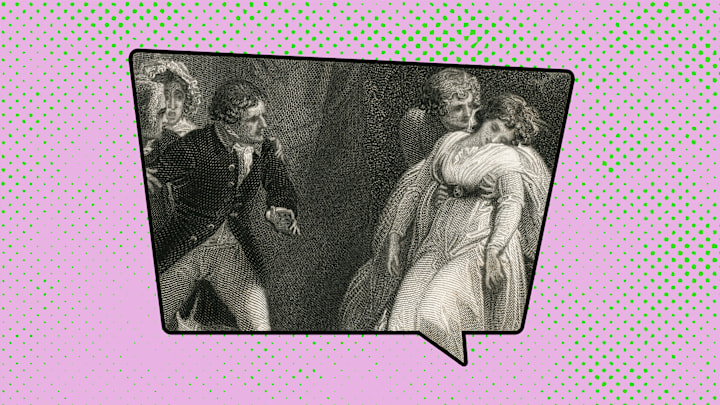If you’ve ever had a strong emotion like love take hold of you all of a sudden, you likely understand why people may describe the experience as going weak at the knees—especially around objects of their desire. In honor of Valentine’s Day, we’re breaking down where this classic turn-of-phrase most likely comes from, including its ties to religion, astrology, and even ancient Rome.
Origins in Roman Literature
The idea of trembling knees due to overwhelming emotion is an old one. Though it wouldn’t appear in English texts until around the 16th century, the concept can be traced back to Rome (and was likely around before that, especially in oral traditions).
One of its earliest written appearances is in a poem in Horace’s Odes, published in 23 BCE:
“You fly me, Chloe, as o’er trackless hills
A young fawn runs her timorous dam to find,
Whom empty terror thrills
Of woods and whispering wind.
Whether ’tis Spring’s first shiver, faintly heard
Through the light leaves, or lizards in the brake
The rustling thorns have stirr’d,
Her heart, her knees, they quake.
Yet I, who chase you, no grim lion am,
No tiger fell, to crush you in my gripe:
Come, learn to leave your dam,
For lover’s kisses ripe.”
It’s possible that young Chloe, in this poem, may be partially weak in the knees due to a burgeoning romance. But there is also indisputably an element of fear or nervousness in her depiction as a fawn “thrilled by terror” at being an object of romantic pursuit.
Fear is, therefore, intertwined with the reaction in this early example, and this association continues several decades later, in Ovid’s Metamorphoses from 8 CE. When unsuspecting Phoenicians stumble upon a dragon in the forest, Ovid writes: “A sudden trembling shook their knees; and their life-blood was ice within their veins.”
The Bible Brings the Phrase to English
For centuries, the phrase weak at the knees was strongly linked to fear. However, this is because its earliest appearances in English were in the Bible, lending it a distinctly religious tinge at the beginning. Instead of weak at the knees indicating solely fear and/or desire, as it generally does nowadays, it could also indicate a lapse in religious faith.
Doubt and distaste for religion were said to cause people to have weak knees. The idea was transmitted from Hebrew to Greek and Latin, and from the around the 1300s onward, trembling knees became a popular image evoked by religious leaders to denote individuals facing a moment of irresolution, doubt, and/or fear. Soon therafter, weak-kneed became a way to describe such folks.
The first time the phrase weak knees made its way into written English was in a 1534 New Testament translation by William Tyndale, which interprets Hebrews 12:12 as “Stretch forthe therfore agayne the hondes {hands} which were let doune & the weake knees.”
Soon, it moved into the secular arena, coming to mean disloyal or traitorous as well. In John Ford’s 1634 play The Chronicle Historie of Perkin Warbeck, featuring a failed ploy to overthrow King Henry VII of England, a conspirator in the plot pleads:
“Let my weake knees rot on the earth,
If I appeare as leap’rous in my treacheries,
Before your royall eyes; as to mine owne
I seeme a Monster, by my breach of truth.”
It would be another century before the full weak in the knees phrase would reappear—hilariously, describing people born under the zodiac sign Capricorn as “weak in the knees, not active or ingenious, subject to debauchery and scandalous actions; of low esteem, &c. amongst his associates.” (Sorry to any Capricorns out there.)
Unfortunately, how the expression overcame centuries of negative connotations to also indicate overwhelming desire isn’t exactly known. It’s possible, though, that it’s because actually going physically weak in the knees—when it’s not a medical issue—has been linked to strong surges of emotion, regardless of whether they’re positive or negative. Even a particularly joyous laugh could potentially spark weak knees, so Valentine’s Day may not be the only holiday you have to worry about it happening during. April Fools Day is just right around the corner, after all.
Have you got a Big Question you'd like us to answer? If so, let us know by emailing us at bigquestions@mentalfloss.com.
Read More Big Questions Below:
